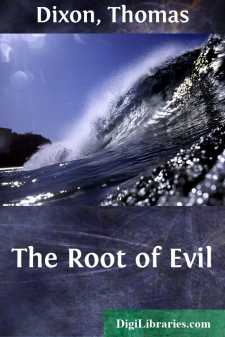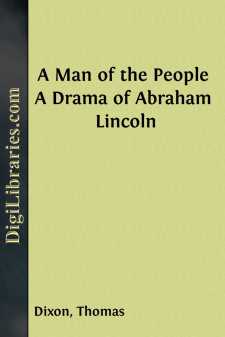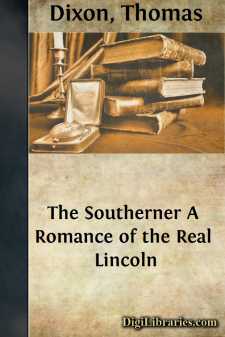Categories
- Antiques & Collectibles 13
- Architecture 36
- Art 48
- Bibles 22
- Biography & Autobiography 813
- Body, Mind & Spirit 142
- Business & Economics 28
- Children's Books 17
- Children's Fiction 14
- Computers 4
- Cooking 94
- Crafts & Hobbies 4
- Drama 346
- Education 46
- Family & Relationships 57
- Fiction 11829
- Games 19
- Gardening 17
- Health & Fitness 34
- History 1377
- House & Home 1
- Humor 147
- Juvenile Fiction 1873
- Juvenile Nonfiction 202
- Language Arts & Disciplines 88
- Law 16
- Literary Collections 686
- Literary Criticism 179
- Mathematics 13
- Medical 41
- Music 40
- Nature 179
- Non-Classifiable 1768
- Performing Arts 7
- Periodicals 1453
- Philosophy 64
- Photography 2
- Poetry 896
- Political Science 203
- Psychology 42
- Reference 154
- Religion 513
- Science 126
- Self-Help 84
- Social Science 81
- Sports & Recreation 34
- Study Aids 3
- Technology & Engineering 59
- Transportation 23
- Travel 463
- True Crime 29
Thomas Dixon
Thomas Dixon (1864-1946) was an American novelist, playwright, and minister known for his controversial works that often promoted white supremacist views. His most famous novel, "The Clansman," served as the basis for D.W. Griffith's 1915 film "The Birth of a Nation," which depicted the Ku Klux Klan as heroes. Dixon's works significantly influenced early 20th-century American culture and race relations, though they have been widely criticized for their racist content and historical inaccuracies.
Author's Books:
Sort by:
by:
Thomas Dixon
CHAPTER I A STAR BOARDER At the end of a warm spring day in New York, James Stuart sat in the open window of his room on Washington Square, smiling. With a sense of deep joy he watched the trees shake the raindrops from their new emerald robes, and the flying clouds that flecked the Western sky melt into seas of purple and gold. A huckster turned into Fourth Street, crying: "Straw—berries!...
more...
by:
Thomas Dixon
CHAPTER I THE CURTAIN RISES "For the Lord's sake, Jennie—" Dick Welford paused at the bottom of a range of steps which wound up the capitol hill from Pennsylvania Avenue. The girl standing at the top stamped her foot imperiously. "Hurry—hurry!" "I won't—" "Then I'll leave you!" The boy laughed. "You don't dare. It's barely sunup—still...
more...
by:
Thomas Dixon
CHAPTER I The Bruised Reed The fair girl who was playing a banjo and singing to the wounded soldiers suddenly stopped, and, turning to the surgeon, whispered: “What’s that?” “It sounds like a mob——” With a common impulse they moved to the open window of the hospital and listened. On the soft spring air came the roar of excited thousands sweeping down the avenue from the Capitol toward the...
more...
by:
Thomas Dixon
HISTORICAL NOTE While the popular conception of Lincoln as the Liberator of the Slave is true historically, there is a deeper view of his life and character. He was the savior, if not the real creator, of the American Union of free Democratic States. His proclamation of emancipation was purely an incident of war. The first policy of his administration was to save the Union. To this fact we owe a united...
more...
by:
Thomas Dixon
Tom seated himself at the table and looked into his wife's face with a smile: "Nancy, it's a meal fit for a king!" The supper over, he smoked his pipe before the cabin fire of blazing logs, while she cleared the wooden dishes. He watched her get the paper, goose-quill pen and ink as a prisoner sees the scaffold building for his execution. "Now we're all ready," she said...
more...
by:
Thomas Dixon
CHAPTER I. A FRIENDLY WARNING "Mary Adams, you're a fool!" The single dimple in a smooth red cheek smiled in answer. "You're repeating yourself, Jane——" "You won't give him one hour's time for just three sittings?" "Not a second for one sitting——" "Hopeless!" Mary smiled provokingly, her white teeth gleaming in obstinate good humor....
more...
by:
Thomas Dixon
CHAPTER I THE MAN AND THE WOMAN "Quick—a glass of water!" A man sprang to his feet, beckoning to an usher. When he reached the seat, the woman had recovered by a supreme effort of will and sat erect, her face flushed with anger at her own weakness. "Thank you, I am quite well now," she said with dignity. The man settled back and the usher returned to his place and stood watching her...
more...








